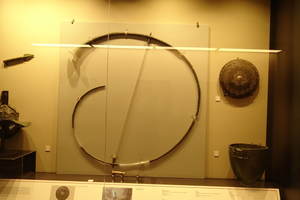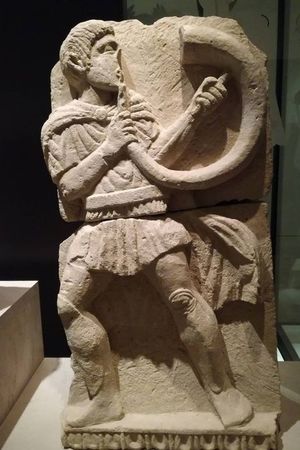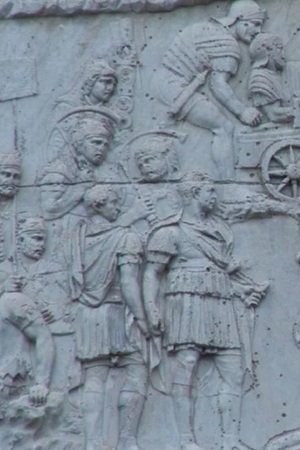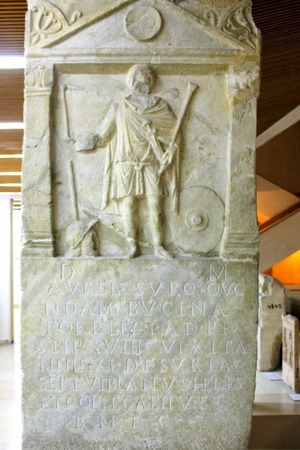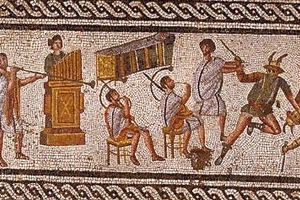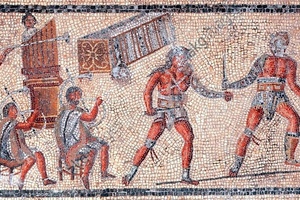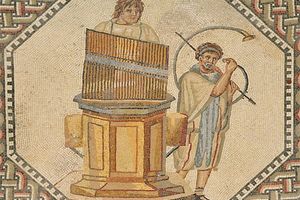Bucinator
Bucinator (Latin: bucinator) was a legion trumpeter who played the buccina. In formation, bucinators stood next to the standard-bearer, issuing commands for assembling around the battle standard and conveying orders from the commander to the legionaries through buccina signals.
Buccina (Latin: buccina/bucina, from bucca meaning "cheek," Greek: βυκάνη) was a brass wind instrument in ancient Rome.
The buccina was a narrow copper tube, approximately 11-12 feet long, curved in a semicircular shape, with a cup-shaped mouthpiece and a horizontal crossbar that the musician held the instrument with during play. Written sources do not describe clear distinctions between the buccina and other brass instruments, except that the buccina was a shortened variation of the cornu. It also mentions at least three types of musicians: tubicines, cornicines, and bucinators.
The buccina produced low, harsh sounds that signaled changing of the guard, the arrival of a legate, emperor, or military commander, as well as the announcement of various orders and death sentences.
The buccina is mentioned in ancient literature. For example, the ancient poet Ovid (43 BCE - 8 CE) wrote about tritons playing the buccina in his work "Metamorphoses."
Vegetius Flavius Renatus mentioned bucinators in his "Epitoma Rei Militaris":
"...the signal given by the musicians on the horns is called "classicum." This signal pertains to the highest command since the "classicum" signal is given in the presence of the emperor or when a warrior is being punished with a death sentence, as it is obligatory that this be done based on imperial decrees..."
There is also the following description on the tombstone of a bucinator, Lucius Spurinnius Rufus, from 201-250 CE in Bulgaria (Polski Trumbesh, 8. AE.1892.109; CIL.III.12437; ILBulg.395):
"...To the Gods Manes. If the gods of the Manes exist, they know that you were the hopes of our lives. Now this stone indicates where rests the one who existed. Lucius Spurinnius Herculanus, brother, and Flavia Paula, mother, to Lucius Spurinnius Rufus, bucinator of the Mattiacian cohort, who served for 20 years, well-deserving, set up (this tombstone). Be well, passing travelers."
A musician who played the buccina was called a "cheek muscle" or a "bucinator." Bucinators served not only in the infantry but also in the navy. During marches, they usually gave general signals such as "march," "to battle," "drop anchor," and so on. Bucinators were considered junior officers - principals.
Musicians who played the buccina were not limited to the military. Numerous depictions have been preserved where they are shown playing not in a combat situation but, for example, at gladiatorial games.
One distinguishing feature of Roman military musicians was the animal skin draped over their helmets and tied at the chest with the front paws, similar to other members of the legion's standard group. Their weapons consisted of a gladius and a pugio. As protective equipment, bucinators used lorica hamata or lorica squamata, as well as a small round shield called a parma, which was carried on a strap at the side.
Related topics
Legionnaire, Legion's standard group, Cornicen, Tubucen, Roman Army helmets, Gladius, Pugio, Lorica Hamata, Lorica Squamata, Parma
Literature
- Rubtsov S.M. "Legions of Rome on the Lower Danube: The Military History of Roman-Dacian Wars (end of the 1st - beginning of the 2nd century CE)." - St. Petersburg: Petersburg Oriental Studies, Moscow: Philomatis, 2003 - 256 p. (Series "Militaria Antiqua," III)
- Rubtsov S.M. "Legions. Organization and Composition." (2008). Accessed July 12, 2009. Archived May 19, 2012.
- Flavius Vegetius Renatus, translated by S.P. Kondratyev. "Epitoma Rei Militaris" (2006). Accessed July 12, 2009. Archived May 19, 2012.
- Military-Historical Dictionary (1998). Accessed July 12, 2009. (Link unavailable)
- Buccina // Brockhaus and Efron Encyclopedic Dictionary: In 86 volumes (82 volumes and 4 supplements). - St. Petersburg, 1890-1907.

 Gallery
Gallery






